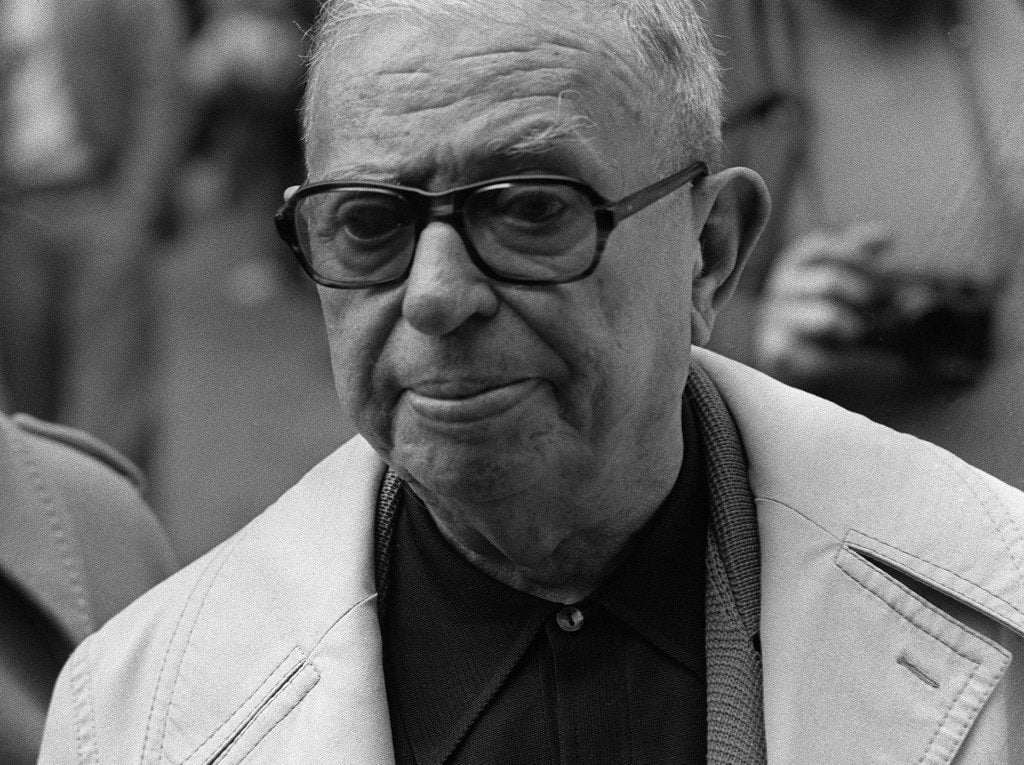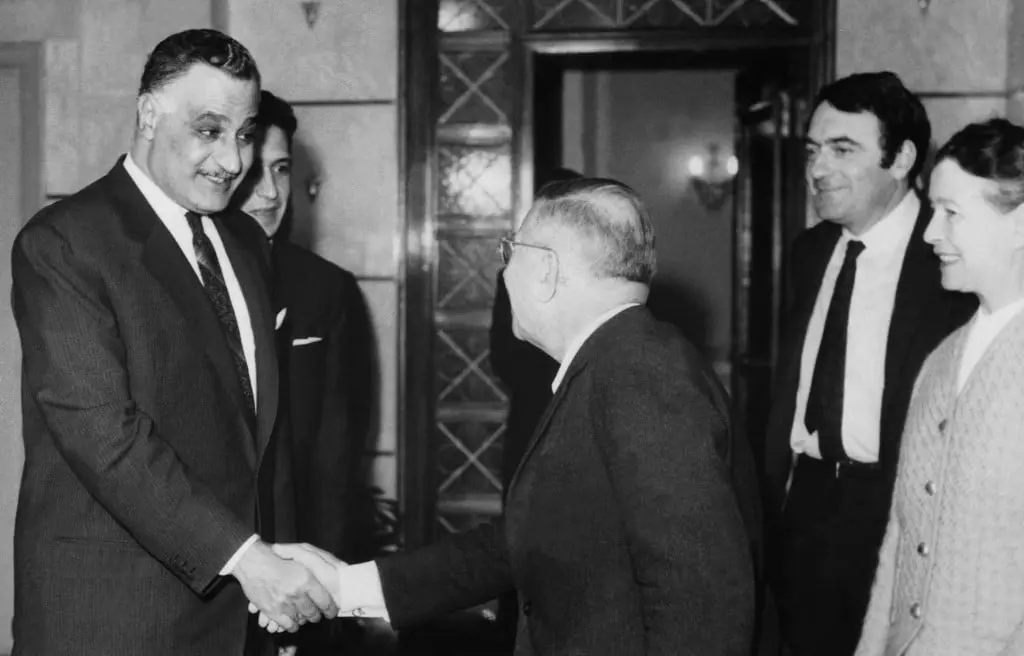
Youssef Sharqawi
It is quite fair to say that the French existential philosopher Jean Paul Sartre had an unlimited effect on the Arab world. Since establishing his existential school of thought, he impressed Arab intellectuals and thinkers. They wrote about him, translated his work and saw him as a striver thinker and a supporter of Libertarian revolutions all over the world. We can see that admiration in Arabic newspapers’ headlines describing him as “the conscience of our era” during his visit to Cairo in 1967. Sartre replied back then: “Am I the conscience of the whole era? I’m not even the conscience of myself!”
This reply seems like a joke. However, it represents the whole truth as Sartre wasn’t even the conscience of himself. The philosopher was unfair to a whole human group and ripped it off its existential right. He is the same man who was treated as if he is a bunch of international organizations. Moreover, many hopes were hanged upon him.
Arab intellectuals pinned their hopes on Sartre to take a stance towards the Palestinian Cause during his visit to Cairo in 1967. However, it seems strange that they weren’t aware of the stance that the French philosopher already took many years ago. Specifically, in 1944, when he wrote his thesis: “Anti-Semite and Jew”. This thesis wasn’t translated into Arabic until a few years ago.
Sartre’s visit to Cairo was a failure before it even started. Meanwhile, Arab intellectuals were waiting for his opinion regarding the Arab–Israeli conflict. The philosopher, who was a well-known figure in the twentieth century, had a stance that had enormous effects but he was unfair.
A few years ago, professor Hatem El-Gohary did not only translate Sartre’s book “Anti-Semite and Jew” to Arabic. He also added a study about the French prominent figure. In that study, El-Gohary clarified that Sartre didn’t just give political support for Zionism. He also proposed a philosophical theory that regards it as a true representative of Jews’ right of free existence and expressing themselves as a group that has “a common existential stance”.
The thesis was one of the most important publications that propagated Zionism -While Arab intellectuals were not aware of it. Sartre introduced Zionism as the solution for the Holocaust in Europe. He considered anyone opposing Zionism as a supporter of Nazism. By this he treated Arabs, in general, and Palestinian, in particular, as if they have to atone for Europe’s guilt and pay the price for washing its history and hands from blood.

Sartre, who Arabs were waiting for, portrayed them as a continuum of the “European Nazi” who persecuted Jews and threatened their existence. Moreover, the man did not recognize Palestinians and ripped them off their existential right through three stages. First, he denied Palestinians and ignored their right of free existence as he was affected by Nazi persecution events in the period he was writing his thesis. Second, he portrayed Arabs as aggressors, persecutors and Nazis. When he realized how absurd his stance was, he took a more balanced stance to save his image. He considered Arabs as victims and aggrieved people like the Jews in Europe.
The Sartrian stance was common among French intellectuals’ circles and many of Europeans. Meanwhile, Arab intellectuals were still waiting without knowing Sartre’s opinion regarding this matter.
Sarter, who established existentialism as a humanistic ideology, ignored ideas as the “existential justice” and the “reciprocal freedom”. The French thinker turned a blind eye to the Israeli occupation of the Palestinian’s land. He didn’t mention the logic of justice and the Palestinians’ free right to exist. Moreover, he ripped them off their existence through his nominal approach without using a historical approach to address the problem and analyze its core. Instead of that, he depended on a bunch of personal impressions that he gathered from a group of people in private interviews.
His philosophy was based on the notion of “Now”. He didn’t consider anything beyond “the present moment”. In addition, he didn’t refer in his thesis to historical resources and books as much as he referred to contemporary opinions.
Soon, Zionism used Sartre’s philosophy and his notion of Antisemitism. After that, the notion of “Anti-Zionism” leant on his figure and his historic umbrella.
Sartre forgot to call for Palestinians’ free right to exist. He ripped them of it. They were left with two compelling existential choices as a result of Zionist persecution: Either hold weapons to defend their existence or live in a forced diaspora and a Palestinian loss.
Arabs kept waiting and the man came back from Cairo. During the 1967 war, he signed a petition that put the responsibility for the outbreak of war on Arabs. He announced, with a number of intellectuals, their full support for Israel. Their defiance was formidable. Moreover, they denunciated what they then called “threatening Israel’s security by Arabic countries.” The petition called only for starting direct negotiations with sovereign states without mentioning Palestinians’ legitimate right to establish their independent state. In addition, the French philosopher used very negative expressions while talking about Arabs. An example of that is his following quote: “Arab gangs are getting ready around Haifa. A massacre has been prepared”. However, Palestinians were the slaughters in countless massacres.

This was a disappointment that hit Arabs before knowing that Sartre already had these opinions two decades ago when he wrote his thesis. But when Sartre’s stance towards persecuted Palestinians became embarrassing, he started mentioning them and dealing with their existence.
Nevertheless, that came in line with specific conditions. His stance towards Palestinians was based on absorbing and integrating them within his sacred value: the existence of Israel.
Sartre forgot to call for recognizing Palestinians as they are. He wanted to strip them of the fact that they have been displaced and their land has been stolen. Moreover, the well-known philosopher wanted to absorb them without taking their rights into consideration. He saw that the unsolved problem is the existence of Palestinian refugees not the existence of the Palestinian people themselves.
The French philosopher recognized the absurdity of his stance in the late 1960s. After 20 years from writing his thesis, he said: “Now, I see that the Arab world and Israel are really clashing. I live, by this clash, as if it is my calamity. The dialogue between Arabs Israel is impossible as there isn’t the necessary foundation for it.”
The philosopher of humanistic freedom dipped in his sin when he ripped the Palestinian human of his right to exist. He considered the relation between the Israeli occupation and the Palestinians as an equal relation between two aggrieved parties. As Dr. Hatem El-Gohary clarified, Sartre’s justification of his support to the “Israeli right” at the expense of “Palestinian right” dislocates time, space and history. Regarding space, Jews faced persecution in Europe, so why should the the solution be in Palestine? When it comes to time, Europe persecuted Jews during the Middle Ages, so why should the solution be arranged in the twentieth century at the expense of Palestine? From a historical perspective, the existence of Jews in the region as a political power has ended two thousand years ago. That leads me to ask the last following question: Wat makes anyone use history to justify stealing of the Palestinian right?
Sources & References
[1] The Arabic translation of Jean Paul Sartre “Anti-Semite and Jew”. The book came under the following name (Contemplations in the Jewish Question).
[2] A study in Arabic made by Dr. Hatem El-Gouhary under the title (Sartre between Zionism and Stripping the Existential Right of Palestinians).
[3] A book in Arabic with the following name (Sartre and Modern Arab Thinking).
[4] A book translated into Arabic under the title “Simone de Beauvoir and Jean Paul Sartre: Face to Face” – Originally “Tête-à-tête” by Hazel Rowley.
DISCLAIMER
The opinions expressed in this publication are those of our bloggers. They do not purport to reflect the opinions or views of Fanack or its Board of Editors.


